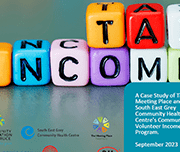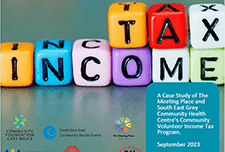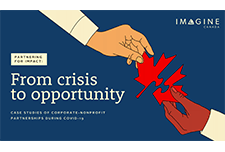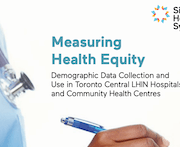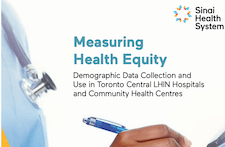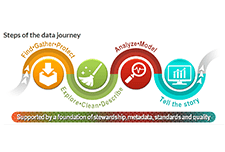Partnering for impact: From crisis to opportunity (Case studies of corporate-nonprofit partnerships during COVID-19)
This report delves into one of the community investment trends that emerged during the pandemic: innovative partnerships. This research follows the Wake Up Call study, released in the Fall of 2020, and continues to answer the question of: how can corporate philanthropy do better, and do more? Answers emerge through nine case studies, representing various initiatives that are either entirely new, have undergone significant change during the pandemic, or have achieved unprecedented growth. Each case study provides invaluable insights for companies looking to achieve greater impact through their partnerships. Imagine Canada conducted close to 40 interviews with the individuals involved in the partnerships, complemented by documentary evidence collected in 2020-21. The case studies involve partners from leading companies and social impact organizations, such as Cisco, AstraZeneca, RBC, CanadaHelps, and Second Harvest.
Virtual VITA Toolkit: Program Strategies
Program strategies grounded in an understanding of your community can increase the likelihood of engagement and follow-through. The following resources are intended to support VITA programs with implementation strategies at key program stages, like outreach and intake, and offer examples of how other virtual VITA programs have addressed critical challenges.
Measuring Health Equity: Demographic Data Collection in Health Care
The Toronto Central Local Health Integration Network (Toronto Central LHIN) provided financial support to establish the Measuring Health Equity Project and has called for recommendations on health equity data use and a sustainability approach for future data collection. This report describes the journey Toronto Central LHIN and Sinai Health System have taken to embed demographic data collection in hospitals and Community Health Centres. It also summarizes the potential impact of embedding demographic data collection into Ontario health-care delivery and planning. And finally, it describes the use of this data, the lessons learned, and provides recommendations for moving forward.
Data literacy training
Statistics Canada presents a learning catalogue to share knowledge on data literacy. Data literacy is the ability to derive meaningful information from data. It focuses on the competencies involved in working with data including the knowledge and skills to read, analyze, interpret, visualize and communicate data as well as understand the use of data in decision-making. Their aim is to provide learners with information on the basic concepts and skills with regard to a range of data literacy topics. The training is aimed at those who are new to data or those who have some experience with data but may need a refresher or want to expand their knowledge.
English
Benefits 101
What are tax credits and benefits
Reasons to file a tax return
List of common benefits
Getting government payments by direct deposit
Common benefits and credits Benefits pathways (for practitioner reference only – some illustrations presented are Ontario benefits)
Pathways to accessing government benefits
Overview of tax benefits and other income supports (adults, children, seniors)
Overview of tax benefits and other income supports (people with disabilities or survivors)
Income support programs for immigrants and refugees
Glossary of terms – Benefits 101
Resources – Benefits 101
Key benefits you may be eligible for
Make sure you maximize the benefits you are entitled to if you are First Nations, Inuit, or Métis
Benefits of Filing a Tax Return: Infographic
Common benefits and credits
Resource links:
Benefits and credits for newcomers to Canada – Canada Revenue Agency
Benefit Finder – Government of Canada
Electronic Benefits and credits date reminders – Canada Revenue Agency (CRA)
Income Assistance Handbook – Government of Northwest Territories
What to do when you get money from the government – Financial Consumer Agency of Canada (FCAC)
Emergency benefits
General emergency government benefits information & navigation
Financial Relief Navigator tool (Prosper Canada)
Changes to taxes and benefits: CRA and COVID-19 – Government of Canada
Canada Emergency Response Benefit (CERB)
Apply for Canada Emergency Response Benefit (CERB) with CRA – Canada Revenue Agency (CRA)
Questions & Answers on CERB – Government of Canada
What is the CERB? – Prosper Canada
FAQ: Canada Emergency Response Benefit – Prosper Canada (updated June 10th)
CERB: What you need to know about cashing your cheque – FCAC
COVID-19 Benefits (summary, includes Ontario) – CLEO/Steps to Justice
COVID-19 Employment and Work – CLEO/Steps to Justice
GST/HST credit and Canada Child Benefit
COVID-19 – Increase to the GST/HST amount – Government of Canada
Canada Child Benefit Payment Increase – Government of Canada
Benefits payments for eligible Canadians to extend to Fall 2020 – Government of Canada
Support for students
Support for students and recent graduates – Government of Canada
Canada Emergency Student Benefit (CESB) – Government of Canada
Benefits and credits for families with children
Benefits and credits for families with children
Resource links:
Child and family benefits – Government of Canada
Child and family benefits calculator – Government of Canada
Benefits and credits for people with disabilities
Benefits and credits for people with disabilities
RDSP, grants and bonds
Resource links:
Canada Pension Plan disability benefit toolkit – Employment and Social Development Canada (ESDC)
Disability benefits – Government of Canada
Disability tax credit (DTC) – Canada Revenue Agency (CRA)
Free RDSP Calculator for Canadians – Plan Institute
Future Planning Tool – Plan Institute
Creating Financial Security: Financial Planning in Support of a Relative with a Disability (handbook) – Partners for Planning
Nurturing Supportive Relationships: The Foundation to a Secure Future (handbook) – Partners for Planning
RDSP – Plan Institute
Disability Tax Credit Tool – Disability Alliance BC
ODSP Appeal Handbook – CLEO
Disability Inclusion Analysis of Government of Canada’s Response to COVID-19 (report and fact sheets) – Live Work Well Research Centre
Demystifying the Disability Tax Credit – Canada Revenue Agency (CRA)
Benefits and credits for seniors
Benefits and credits for seniors
Resource links:
Canadian Retirement Income Calculator – Government of Canada
Comparing Retirement Savings Options – Financial Consumer Agency of Canada (FCAC)
Federal Provincial Territorial Ministers Responsible for Seniors Forum – Employment and Social Services Canada (ESDC)
Retiring on a low income – Open Policy Ontario
RRSP vs GIS Calculator – Daniela Baron
Sources of income for seniors handout – West Neighbourhood House
What every older Canadian should know about: Income and benefits from government programs – Employment and Social Services Canada (ESDC)
French
Comprendre les prestations
Que sont les crédits d’impôt et les prestations?
Pourquoi produire une déclaration de revenus?
Processus d’accès aux prestations (simple, complexe ou laborieux)
Aperçu des prestations et crédits d’impôt et des autres mesures d’aide au revenu
Aperçu des prestations et crédits d’impôt et des autres mesures d’aide au revenu : personnes handicapées ou survivants
Programmes d’aide au revenu pour immigrants et réfugiés – Admissibilité et processus de demande
Glossaire – Prestations et credits
Ressources : Prestations et credits
Principales mesures d’aide auxquelles vous pouvez être admissibles
Assurez-vous de maximiser les prestations auxquelles vous avez droit si vous êtes Autochtone,
Infographie sur les avantages de produire une déclaration de revenus
Prestations et crédits courants
Prestations et crédits pour familles avec enfants
Prestations et crédits pour personnes handicapées
Prestations et crédits pour les personnes âgées
Informations d’identification pour accéder aux prestations
Études de cas
Investor Protection Clinic and Living Lab: 2019 Annual Report
The Investor Protection Clinic, the first clinic of its kind in Canada, provides free legal advice to people who believe their investments were mishandled and who cannot afford a lawyer. The Clinic was founded together with the Canadian Foundation for Advancement of Investor Rights (FAIR Canada), an organization that aims to enhance the rights of Canadian shareholders and individual investors. The 2019 Annual Report summarizes the work of The Clinic, including description of the work and types of cases, example case scenarios of the clients who benefited from The Clinic's services, client data and demographics, and recommendations.
Supporting Employee Financial Stability: How Philanthropy Catalyzes Workplace Financial Coaching Programs
More than half of all employees in the United States report that they are This report describes different workplace models, the common characteristics and challenges of programs, and provides recommendations for funders who want to invest in workplace approaches to help workers achieve financial stability.
financially stressed, and nearly one in three employees reports being distracted by personal financial issues while at work. This financial stress impacts individuals’ health, relationships, productivity, and time away from work.
Enhancing access to the Canada Learning Bond
This discussion paper responds to a request from ESDC to develop options for reforms to the Canada Education Savings Program and, more specifically to improve access to the Canada Learning Bond. It reviews individual and institutional challenges to participation in the current system and consider three approaches for reform. It presents a case study of the United Kingdom’s Child Trust Fund, which included an auto-enrolment default mechanism. It concludes that the model used in the UK is not suitable for Canada and instead make a series of recommendations for both incremental and more ambitious reforms to fulfill the Government’s commitment to improve access to the Bond.

